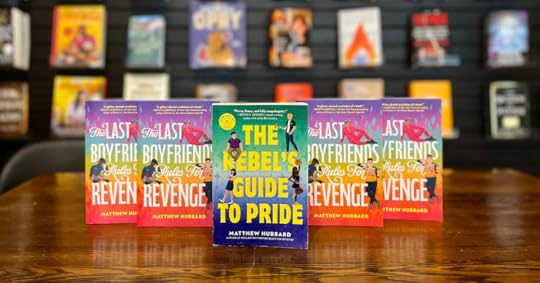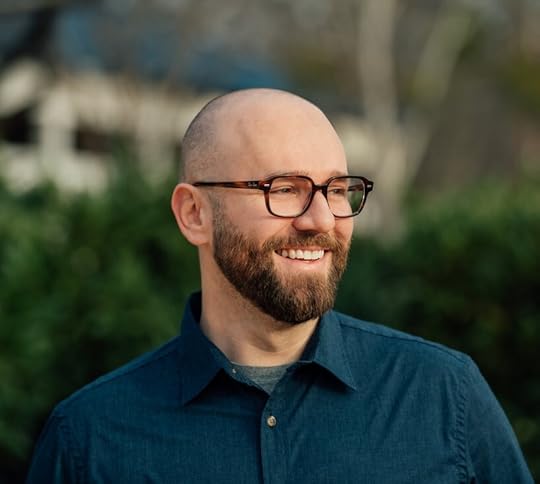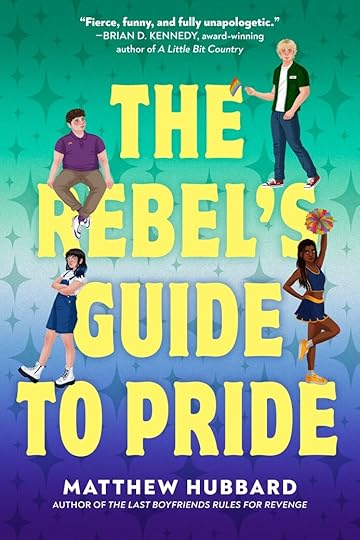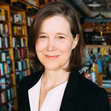An Interview with Matthew Hubbard & an Excerpt from His Forthcoming Novel

Tennessee author Matthew Hubbard is back with another timely, heartwarming, and hopeful story of queer resistance and joy. Parnassus floor manager Katie Garaby chatted with Matthew about The Rebel’s Guide to Pride (out May 6, 2025), and Matthew was even kind enough to share an excerpt of the book! Pre-order now to get a signed/personalized copy!
 Matthew Hubbard | Photo by Mandy Rhoden
Matthew Hubbard | Photo by Mandy RhodenKatie Garaby: I’ve had the honor of following your writing career for nearly a decade now, and seeing your dreams come true has been an immense privilege. Can you tell us a little bit about your path to writing and why YA books are so important to you?
Matthew Hubbard: My path to writing started back in my early teens when I tried to write my own version of a popular children’s book, but it wasn’t until my last year of college that I’d finished a manuscript. I had attempted to find a literary agent with no luck. Then I wrote another . . . and another . . . and after I wrote my fifth attempt, my life changed after more than a decade trying. I signed with my agent, and she sold my manuscript in a two-book deal to Delacorte Press, who published it as The Last Boyfriends Rules for Revenge in 2024 with The Rebel’s Guide to Pride coming out May 6. Writing queer YA books is so important to me because representation on the page allows readers (of any age!) to come into their own unique identity. But it’s more than that. Seeing yourself represented as a main character lets you know you aren’t alone. This message is of the utmost importance for those, much like my younger self, struggling to belong.
KG: Can you remember the first book you read with queer characters? What was it like to see queerness on page?
MH: The first book I read with queer characters still burns brightly in my memory. It’s The Vast Fields of Ordinary by Nick Burd. I vividly recall the life-changing trip to a bookstore back in 2009 when I saw it on display. The cover was innocuous—a teen boy in a bright plaid shirt lying on green grass—but there was something about it that made me walk over to the shelf. Maybe it was the slight tilt of the boy’s chin or the delicate hand he held against his chest. Either way, I picked it up and read the jacket. It promised a tale of dreamy-eyed misfits, boyfriends, and coming out. With sweaty palms, I immediately put it back and walked away as though a giant arrow flashed above my head. While my friends were busy, I snuck back to the YA section and bought it. Later, when I returned home, I began reading behind a locked door. It was the moment I saw myself for the first time. My life began to make sense as I discovered myself on the pages. So, at 22 years old, I came of age while reading a young adult novel. I felt seen, but most importantly, I didn’t feel like a burden. It was both life-affirming and lifesaving. That moment is a driving force to where I am today, writing YA books for queer teens to see themselves as I did.
KG: Zeke and his friends are up against some big obstacles in their hometown. That can feel daunting for someone at any age. How do you, as a writer, show care for your characters in your books and how are they cared for by their peers so they can get up and fight the good fight each day?
MH: I think my biggest responsibility as an author writing these unfortunately real-life obstacles into my stories is to empower my characters. I like to write myself in as a parent or mentor who cares about them. With Zeke, I stepped into the shoes of his mother and other mentors in town, like Carmen the indie bookstore owner and Owen the ranger. It gave me a way to guide him and his friends as I would my own child. I think it’s crucial to show them how to find their voice and community while advocating for their rights. It’s equally crucial to show them they deserve the many facets of queer joy and friendship. Having these older characters care is my way to show Zeke and reader that they’re worth fighting for, and sometimes knowing you aren’t alone is all you need to get up and face the day.
KG: Something that many of us in the queer community struggle with is being “a good enough gay”. I certainly related to Zeke’s journey as he comes out and tries to figure out what his queer identity looks like. Did you relate at all to Zeke’s struggle and what advice do you give yourself on days you don’t feel like you are a “good enough gay”?
MH: Zeke’s journey is the most personal I’ve ever written because it is also my own. His questioning of where he fits in and how he can make a difference is something I’ve done most of my life. At first, I was terrified to write that into his character, from his shame to his inability to fully comprehend the laws targeting our community. Then I realized I wasn’t alone, but it wasn’t something many of us talk about. It felt important to show Zeke’s struggle and ways to combat it by never giving up—that’s what I tell myself when I don’t feel good enough. As long as I’m trying to better myself, trying to understand and learn and grow, that’s the most important takeaway in his journey.
KG: Zeke and his fellow QSA crew (a mix of besties and frenemies) plan a series of underground speakeasies to combat a city ordinance banning Pride. What I wouldn’t give to kick Mayor Buchannon in the shins. I know that these subversive speakeasies were inspired by The Great Gatsby, but how did you think to put it all together as an act of rebellion for Zeke, Sawyer, Kennedy and Cohen?
MH: The idea of this story came to me in a dream, as cheesy as that is to admit. I’d read news articles on proposed bans on drag and Pride events right before bed. Somehow my mind twisted this harsh reality with the Roaring Twenties and what it must have felt like living in a time of prohibition and speakeasies. As someone who is a fan of The Great Gatsby and the author’s wife, Zelda Fitzgerald (the first American flapper and an Alabama socialite!), I began to make connections from the 1920s to the 2020s. I thought about those queer rebels at Stonewall who fought back, and asked myself what a group of teenage rebels would do if they had speakeasy-style events to fight a mayor’s ban. The result is something bigger than I could have ever imagined when I first jotted down “Zeke and friends hold underground queer speakeasies to combat an anti-Pride law” in my notes.
KG: Do you have a favorite scene from The Rebel’s Guide to Pride? Was there a scene that was hard or felt too close to home?
MH: My favorite scene is also the scene that felt too close to home. Early in the book, Zeke has a shoebox full of everything he’d been made to feel ashamed about: a Pride flag, sign-up forms to join his school’s Queer-Straight Alliance, a newspaper clipping of a protest in DC, etc. Having him go through the things he hid felt like reclaiming parts of myself that I’d also hidden. It was empowering to have Zeke refuse to feel shame for who he is, and it was equally hard digging through the past I’d buried—and I’m so proud of what that meant for his character (and me).
KG: TRGTP is packed full of cultural references, music, television, which gives the book a real richness. Can you talk a bit about this?
MH: I like to ground my characters with cultural references, just enough to make the reader believe this could be a real place with real people happening right now. My approach is to pick references that make sense for the character and serve a purpose, and I think that’s what brings them to life. As much as I wanted Zeke and Sawyer to be Swifties, it didn’t feel right. They wanted to live their “brat summer” and swoon over Chappell Roan. The same goes for Doctor Who rather than Buffy the Vampire Slayer like I’d originally planned, and how a long- running show can shape how they view the world.
KG: What are you working on at the moment?
MH: I’m working on my third book, Drop Dead Handsome, coming out Fall 2026 with Delacorte Romance—my first full-fledged romance that’s a play on Miss Congeniality, one of my favorite movies, but make it queer(er)! It’s about an outspoken senior in Tennessee who enters his high school’s “Miss Spirit” pageant for his college essay, only to face sabotage. With the help of the nerdy but adorable student government president, he sets out to find the culprit while receiving a crash course in the pageantry of first love, while also dealing with the fallout of being in the pageant.
KG: One of my favorite podcasters and comedians, Cameron Esposito, always asks their guests to give a shout out to a “Quero” from their life. This is a queer person you know (or maybe just someone you admire) whose praises you want to shout from the rooftops. Who is your “quero”?
MH: There are so many incredible “queros” in the world, doing wonderful things. The person I thought of immediately is Becky Albertalli. I once admired her greatly from a distance, and now I’m fortunate to call her a friend. Not only has she done wonders for representation on the page, but she also fights for our rights much like Zeke, Sawyer, and the other rebels in The Rebel’s Guide to Pride.
KG: Your book balances queer joy and defiance so beautifully. I think that is really important right now when the world feels like it is spiraling out of control quickly. What is an easy way you’d encourage people to get involved and fight back in their own community?
MH: Thank you! Showcasing queer joy and defiance has become my driving force. While the rest of the world feels like it’s spiraling out of control, I’d encourage people to focus on what they can control. Often, this is in our own community. The easiest way to do this is by speaking out using social media and voicing your concerns at your local school/library board and city council meetings, which you’re entitled to attend. To borrow advice from Zeke’s mother, you never know who is listening, so be proud—and speak up because you don’t know who needs to hear it.
KG: We always end every interview by asking, “what’s your favorite thing about indie bookstores?”
MH: My favorite thing about indie bookstores is the sense of belonging. I make it a point to visit and support an indie bookstore when I venture to new cities. The atmosphere is always welcoming, and my favorite story about indie bookstores is visiting one and asking for a book recommendation. The bookseller took me around the shelves pointing out books she’d read that I might like—that’s what I love. Indie bookstores are real people in real communities who enhance the reading experience.
Exclusive Excerpt: The Rebel’s Guide to Pride by Matthew HubbardExcerpt. © Reprinted by permission. All rights reserved.There’s a run-down building right off Beggs Town Square. I only ever knew it to be the old Walt’s Diner that closed when I was a kid. My mom, however, saw what it could be. She used her life savings to buy it on the same day she left my father. In three months’ time, she’d opened Roaring Mechanics. Its vibrant emerald-green logo shined like a beacon of hope.
Automotive repair was in her genes, and owning her own shop like her father’s had been a lifelong dream. My father had never allowed it, though. What would people think if my wife did manual labor, Katherine? He never understood why she wanted to tinker on engines. That’s why she secretly taught me how, just like my grandfather had shown
her. Working on the family SUV had become our thing over the years. But I never thought living above the mechanic shop would also become our thing.
That week between last Christmas and New Year’s Day had been a blur, but I can still remember how she’d kept promising to make it right as we moved in. With each box we unloaded, I’d replayed the series of events: I came out, my father told my baseball coach it was a joke, the argument over dinner that led to Mom slamming down her fork and declaring, “Enough!” Each moment had led to us starting over, but the second-floor apartment was a considerable downgrade from the plush life we’d had before.
My new room was tiny in comparison to the one I’d grown up in. There was just enough space for a bed, nightstand, and dresser. I told myself it was temporary, a quick escape until she found us a house. Yet nearly six months later, we were still here, still living among boxes and clutter as she tried to save up enough money. At least the lone window in my room opened to a fire escape. I was able to climb down and ride my dirt bike when the walls felt like they were closing in.
And sneak back up without alerting Mom of my comings and goings.
I used it to avoid her after the blue hole. She’d given up on calling me while we were there, and the silence was much worse. I knew she’d have a lot to say when I finally left my room. Until then, I was doing everything I could to put it off.
My backpack was on the bed, the contents of the shoebox I’d swiped from the old bedroom dumped out. Over the years, I’d been using it to hide everything that earned my father’s disapproval. The first spark plug I’d changed in the family SUV. Club forms for the QSA I’d been too afraid to fill out. A rainbow flag Sawyer brought back from last year’s Birmingham Pride, even though we’d argued over me not going. Every volume of the X-Men graphic novels, because he didn’t consider them “real” books. An old edition of The Montgomery Southern Gazette newspaper. And a picture of Mom holding me as a baby
I picked up the frame, a finger tracing along the glass. Mom was standing outside of my grandfather’s mechanic shop in Montgomery. Both of us were looking at the camera, my toothless grin wide as I held on to a doll. That might’ve been the first and last time I’d been truly free, without the JACass domineering my life.
After setting the picture on the dresser, I turned my attention to the newspaper. It was from June 2023 with the headline “THOUSANDS MARCH ON WASHINGTON, DC, FOR PRIDE.” But it was the photo accompanying the article that had stuck with me. An unnamed man was caught mid-scream as he waved a sign protesting anti-LGBTQIA+ bills. The way he stood tall in his black leather jacket identical to mine, ripped jeans, the same maroon Converse sneakers I spent a month searching for—he was who I always wanted to be.
Unapologetically queer.
I carefully tacked it on the wall by my nightstand and then unfolded the rainbow flag. It was huge, with bright colors that lit up the bare white walls of the room. That was how my life felt now after the divorce—a fresh canvas I could color in. I glanced at the space above my headboard and knew it would look perfect there.
As I hung it up, I heard the distinct sound of a chair scraping across the floor. My breath stilled as footsteps padded down the hallway. Mom had left the small dinette she used as a home office, each creaking step coming closer to my room.
Here we go, I thought as the doorknob twisted. Her presence brought the smell of flowery perfume like the gardenias she’d planted in our old front yard. Slowly, I pushed in the last thumbtack on the flag without looking at her. Silence exuded from where she stood at the threshold while I waited for her to lay into me.
“Zeke,” Mom finally said, but her tone didn’t denote any anger. Instead, it sounded like it always did when she called me the middle name she’d chosen. Like she said it with a smile because she named me after Zelda Fitzgerald, her favorite woman in history.
“Sorry I didn’t answer your calls,” I said with caution, finally turning toward her. “Sawyer and I were swimming and—”
“Dear god.” Mom cut me off with a sharp intake of breath. “What happened, hun?”
She hurried toward me and tilted my chin down to get a better look at my eye. Heartbeats throbbed in my face as she studied the bruise. Lines etched on her brow, and I knew that look. It was the same overthinking one I saw in the mirror—along with the same heart-shaped face and unruly blond waves. However, it was the green of her eyes that set us apart, never letting me forget I was my father’s son.
“Did you get in another fight?” she asked through an exasperated sigh.
“What’s your definition of a fight?” I countered. “Because I threw a punch, and then he threw one. That’s all.”
“That’s two too many.” She pursed her lips, standing on her tiptoes to inspect the damage. “At least you don’t need stitches again.”
“It was totally my bad. I misjudged Billy’s strength. Next time—”
“There better not be a next time, Zeke. You’re gonna get hurt if you don’t stop picking fights.” She shook her head slowly, collecting her thoughts. “Does this have something to do with what happened to your dad’s billboard?”
“No … Well, kinda. More like really bad timing.”
“He called to give me an earful.”
“Oh?” My curiosity was piqued. “Please tell me he’s as upset as I’m hoping.”
“Upset would be an understatement,” she admitted and sat down on the edge of my bed. My triumphant grin was short-lived as she exhaled slowly, fixing me with a pleading stare. “You can’t keep causing trouble, Zeke. And don’t even get me started on your grades. He had a lot of thoughts about how it was my fault they slipped this last semester.”
I ducked my head, biting at my lip. We’d had the same conversation right after midterms. My father blamed Mom, and she blamed him for pressuring me. “They’re not so bad, Mom.”
“Not bad?” She laughed loudly like it was the funniest joke. “You bombed so hard that you nearly failed eleventh grade.”
“I think the operative word is ‘nearly.’”
No longer amused, she leveled her gaze. I started to argue but stopped myself. There was no use, because she was onto my self-destructive mission. “Sorry,” I said and took a seat beside her.
She reached across the quilt and grasped my hand. “Hun,” she began, squeezing it gently, “I know it’s been hell, but you can’t let what happened affect your future, okay?”
I nodded even though I didn’t buy her concern. No matter how many times she apologized, she’d still allowed my father to micromanage my life for years. Now I didn’t know what I wanted anymore. Didn’t know who I was without his rules looming over my head. Sometimes, I caught myself wishing I could go back to before. To when I never had to think about where Anthony stopped and Zeke began.
“You need to try,” she added. “Stay out of trouble this summer and start senior year fresh.” I shrugged again; school was the last thing on my mind. “Maybe you’d stay out of trouble if you had a summer job.”
“A what?” I blanched. “Everything’s fine, I promise—”
“You’ve been making a lot of those but not keeping them.” The firm line of her mouth told me she’d made up her mind. “It’s either work or be grounded like your father suggested.”
“I’ll take the first option,” I said quickly, unwilling to give him the satisfaction.
“Thought you’d see it my way,” she said, and bumped my shoulder. “Good thing I already got you a job.”
“Doing what exactly?”
“You’ll be my mechanic assistant this summer,” she explained. “It’ll be like old times when we worked on the SUV together.”
I nodded as the words sank in but knew it would never be like before. Neither one of us was the same person we used to be. The divorce was the first time she’d stood up for herself, for me. My father had manipulated her into thinking she needed him. However, that didn’t excuse the fact she’d allowed him to keep both of us under his thumb. She still felt like a stranger I didn’t know how to trust.
“When do I start?” I asked, accepting my fate.
“Tomorrow—”
“I’m supposed to help the QSA plan for Pride,” I interrupted. “We’re meeting before Sawyer has to work …”
She considered me for a moment and let her gaze drift to the rainbow flag I’d just hung up. “Fine.” She obliged, her narrowed eyes softening. We both knew it hadn’t been easy for me, and she was trying to be more supportive. “You’ll start Friday.”
I groaned inwardly and tried to summon the strength to get through this plot twist. Summer freedom was already fading, and it was only the first day. It would be a long two months stuck in this small-ass town with nothing to do.
The Rebel’s Guide to Pride hits shelves on May 6, 2025. Pre-order your signed/personalized copy!Ann Patchett's Blog
- Ann Patchett's profile
- 27409 followers




